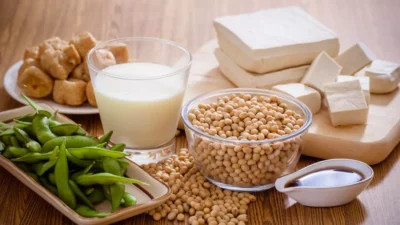Soya fights back
The results of a long-term (over 13 years) study of nearly 50,000 women of all ethnicities revealed that regular intake of plant substances called isoflavones can significantly reduce the risk of endometrial cancer. Endometrial cancer usually means cancer of the inner lining of the uterus but it can spread or affect surrounding tissues. Isoflavones are plant substances (most commonly found in soya foods but also in other pulses such as beans and lentils), which can act as very mild oestrogens in the body. However, the oestrogen effects of isoflavones are much less powerful than those of oestrogens – about 1,000 times weaker. Isoflavones bind to the same receptors in the body as oestrogens and this is why isoflavones have a balancing effect when the levels of oestrogens are low, such as during the menopause, and can ease menopause symptoms. Isoflavones can also reduce the effect of oestrogens when the hormone levels are high, and then essentially reduce the risk of oestrogen linked cancers such as endometrial cancer. The amount recommended as a daily isoflavone intake equals roughly one glass of soya milk or one serving of soya-based food.
Ollberding, N.J., Lim, U., Wilkens, L.R., et al., 2012. Legume, Soy, Tofu, and Isoflavone Intake and Endometrial Cancer Risk in Postmenopausal Women in the Multiethnic Cohort Study. Journal of the National Cancer Institute. 104 (1) 67-76.






